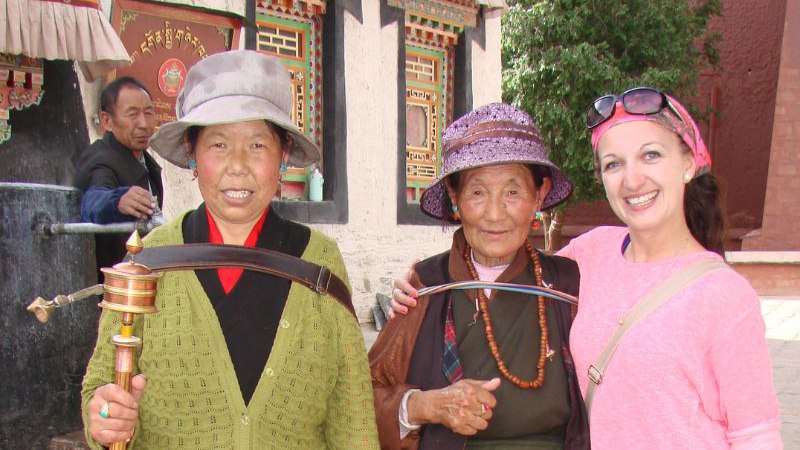Teaching carers to care for themselves
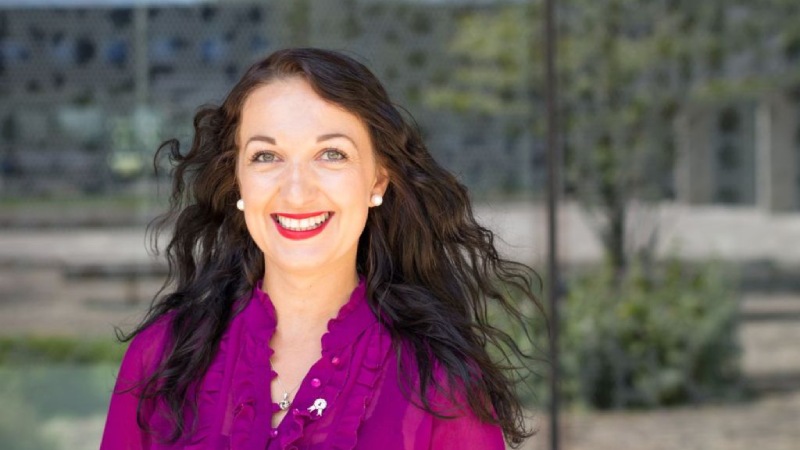
Martina Adamcikova: Addressing mental health issues in humanitarian workers
In 2018, Martina Adamcikova completed an MSc in Development and Emergency Practice. Straight away she got to work turning her research into a practical course which aims – in her words – “to enhance understanding of mental health in crisis settings, build a self-care practice, as well as personal and collective resilience.”
The course started as a module for students at the Centre for Development and Emergency Practice (CENDEP) at Oxford Brookes but from this autumn it will also be available to humanitarian workers wherever they are based.
Martina spoke to us about her drive to care for people, the transformative experience of studying with CENDEP and her long-term ambition to not just treat mental health issues but prevent them arising in the first place.
“In the bottom of my heart I’ve always felt that I want to be in a helping profession,” explains Martina, “I’ve a disabled brother and seeing what my mom had to go through really shaped my values and I learnt how important it is to be compassionate.”
“I decided to volunteer in the Charity of Mother Teresa in Kolkata, where I helped and cared for children with mental and physical disabilities.
“As part of my volunteering experience, I visited Kalighat – a hospice for the sick, destitute and dying, established by Mother Teresa.
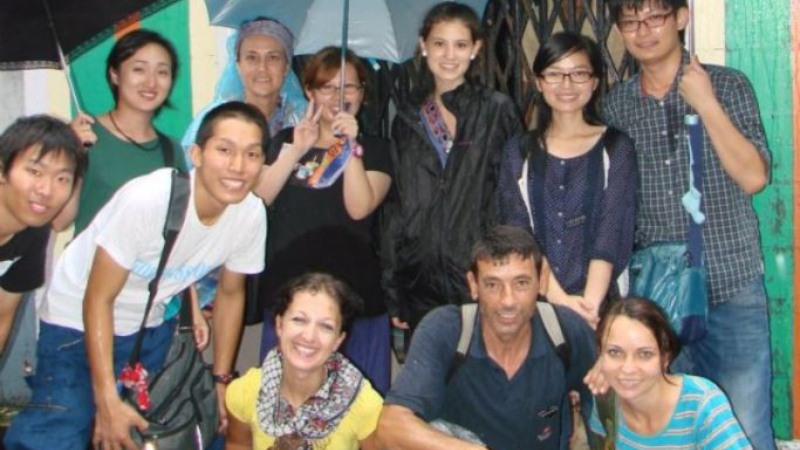
“This was a very powerful experience for me. And a year later, I decided to go to Cambodia to work as a volunteer with HIV positive orphans.”
Whilst these experiences confirmed for Martina that caring for people was what she wanted to do, it was a conversation in Tibet that led her to her next step.
“What really prompted me to make the decision to study with CENDEP was an experience I had in Tibet. It was when I had a discussion with one Tibetan and we were talking about our families. I asked him if he had children and he told me that he didn’t want to have children if they cannot live in freedom.
“And that really struck, the fact that someone is choosing not to have children due to a lack of freedom and the political situation in his country. I felt I wanted to do something about it and on the way home I decided to study the CENDEP course.
“Later, I had an opportunity to write an independent study on violation of human rights in Tibet and was awarded a prize for my research at the Get Published! Conference at Brookes.”
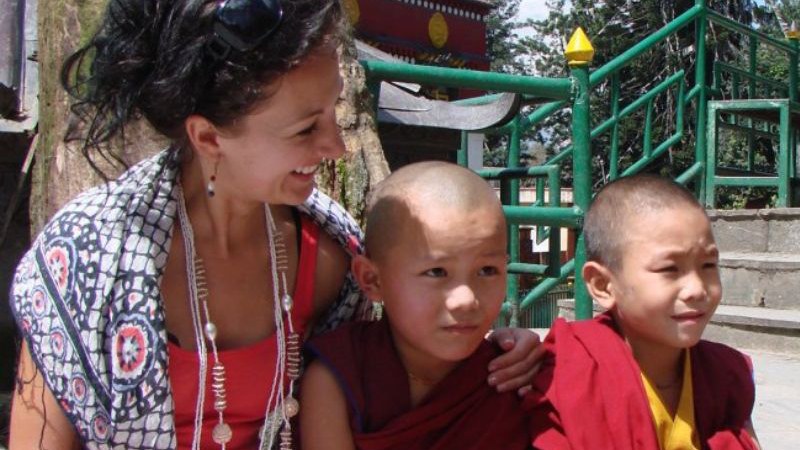
Choosing to study the CENDEP course was transformative for Martina – drawing together a range of international perspectives in a common cause and providing a deeper understanding of what it means to work in emergency situations.
“I absolutely loved the international environment and friendly atmosphere. I am from Slovakia and had classmates from all around the world, for example, South Sudan, Iran, Gaza, Syria, Australia, Nepal, Bangladesh, Lebanon…we were all coming from different backgrounds but during the classes we had to put our differences aside and instead put our heads together and try to solve a problem the best way possible.
“All the lecturers were practitioners and we learnt from top experts in the field. I also loved the opportunities the course offered. For example, I took a field trip to Colombia and received a scholarship to do my dissertation in the Philippines.
“I’ve learnt that there is more than just responding to crises and dealing with disasters. There is the whole human element, like psychological first aid, self-care and wellbeing of those working in crisis.”
As with many Master’s students, one important decision Martina had to make was the subject for her dissertation. Happily, a video call helped to make up her mind.
“To be honest with you, I really didn’t know what my dissertation should be about. I was thinking of writing about communism in Slovakia, something which had a huge impact on my country.
“But then I attended a video call that CENDEP had organised with Save the Children. They mentioned that research into the mental health of humanitarian workers was really needed. And I loved the idea and knew this was going to be my topic for the dissertation. So, the title of my dissertation was ‘Well-being or ill-being? Wellbeing and mental health support in the humanitarian sector’.”
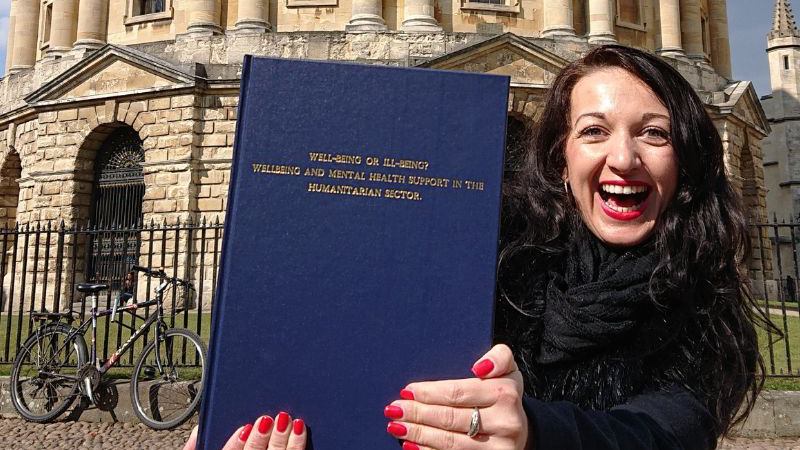
Martina’s dissertation was awarded a distinction. She used the research as the basis for a course so that others could learn from it – a course now available to humanitarian workers wherever they are based (see below).
“My research confirmed that aid workers are suffering from mental health problems and what is even worse, they are scared to talk about this subject and there is a lack of organisational support for them. And I strongly felt that this is something that needs to change.
“So, one of the recommendations from my dissertation was to develop a module on wellbeing and mental health support to help prepare students mentally and emotionally for work in crisis settings. The course was initially aimed at students but we received feedback that professionals working in crisis settings would also benefit from it.
“In today’s frantic world, mental wellbeing is more important than ever and if anyone is working in challenging situations, protecting their wellbeing and resilience must be a necessity.
“This course is designed to give people the skills to take care of themselves and others – from mastering the fundamentals of providing psychosocial first aid and support to ways to deal with stress, trauma, loss and grief.”
Martina’s hope is that the course she now teaches will not just make a difference to emergency professionals who are facing mental health challenges today, but will help to reduce mental health problems in the future.
“My vision is to move from treatment of mental health issues to prevention. The aim of the course is to teach people how to take care not just of others but also of themselves – to build resilience and practice self-care.
“I’d like to put the impact of the course in the words of my favourite quote: ‘One moment can change a day, one day can change a life and one life can change the world.’ And maybe this course can be the moment of change.”
